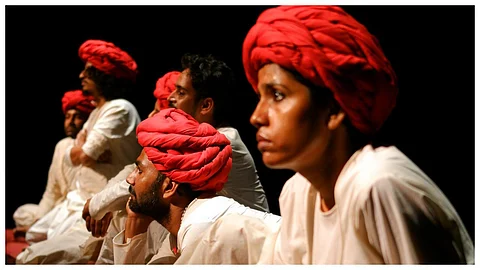
- HOMEGROWN WORLD
- #HGCREATORS
- #HGEXPLORE
- #HGVOICES
- #HGSHOP
- CAREERS
- ABOUT US
- CONTACT US

"Art should comfort the disturbed and disturb the comfortable."
Cesar Cruz
This saying rings particularly true while examining the recently performed play 'Hunkaro' at Delhi’s Mahindra Excellence in Theatre Awards Festival 2023. The 85-minute play, directed by Mohit Takalkar, intriguingly interweaves three stories with themes of strength and hope and the impossibility of life without either of the two. The piece was performed by six trained theatre practitioners in primarily Hindi, Marathi, Haryanvi, and Awadhi dialects. The word Hunkaro literally translates to 'verbal affirmation'. The play is well-stocked with songs from the centennial old Manganiyar tradition but does not have any musical instrument to emphasize the impact of the spoken word.
The play’s plot revolves around six actors, who arrive on stage and sit in a row in front of the audience. They narrate three different tales with one common connection — the pandemic. The three stories written by Vijaydan Detha, Arvind Charan, and Chirag Khandelwal, are narrated in different languages and the intent behind which is to keep the audience on their toes and attentive.
The play is designed in an intricate way to make the viewing experience difficult for the audience, most of which comprises the well-to-do members of society. There is hardly any movement on the stage, except for when the actors follow each other in a single line and return to their original seating position after each tale is narrated. The most difficult aspect of the play is its varied dialects. The stories that they tell are heart-wrenching but the language used is quite inaccessible for most of the audience, who can only understand a few words. The entire gravitas of the performance lies in pure storytelling prowess.
The great American novelist Toni Morrison once said, “All good art is political! There is none that isn't." There is nothing more political than language and the play astutely brings that out. The COVID-19 pandemic was a trying time for the entire world but the degree of suffering largely depended on one’s class position. A boy from a rich urban city may have had a tough time feeling disconnected from his friends and everyday life during the lockdown but that pales in comparison to the struggles and worries of a daily wage earner or a migrant laborer, on whose labored shoulders the weight of his family and his own existence rests.
The struggle of the common worker was invisible to the financially secure section of society and the elite could not fathom the extent of the hardship a worker had to endure during the pandemic. The use of language in the play is built on this foundation to inverse the power dynamics, whereby the workers narrate their own stories in their mother tongue, which is inaccessible to the privileged, with language being a tool to express the privileged's unknowability of the worker's experience. It is a commentary on the elite’s wilful blindness towards class struggle during the dark days of the pandemic.
If and when Hunkaro is staged in your city, be sure to attend it. The beauty of the play lies in its reliability on the audience’s engagement and involvement. This is not art for art’s sake but a rather poignant political piece of art, that is burningly relevant to contemporary times. Even if the stories of the workers or the language may seem inaccessible to the audience, everyone will be united by a recurring emotion in all three stories of the play that pervades all of humanity — providing a glimmer of hope, even in the darkest of times.
